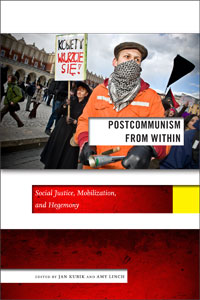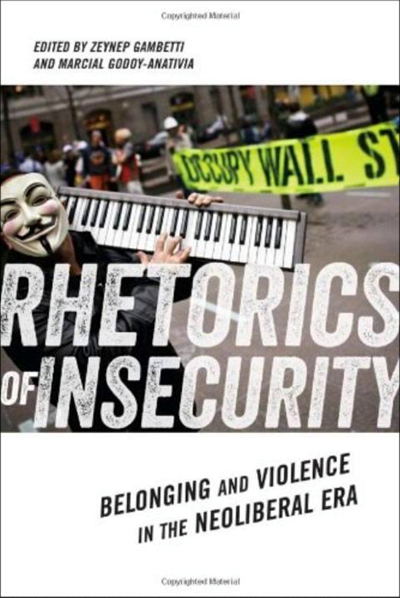|
|
|
New Titles from NYU Press and the SSRC
 |
|
| |
Postcommunism from Within: Social Justice, Mobilization, and Hegemony
A novel approach to understanding one of the greatest political and social transformations in recent history, Postcommunism from Within,
edited by Jan Kubik and Amy Linch, explores not just how citizens
respond to political and economic restructuring engineered at the top
but also how people enact their own visions of life, politics, and
justice by responding to daily challenges. A product of the Eurasia Program
and a cross-programmatic global project on hegemony, this collection of
thematic essays and case studies sets a bold new course for research on
the postcommunist region, and for democratization studies more broadly,
that focuses on social and cultural microprocesses, suggesting ways of
building categories of inquiry that more closely capture the role of
vernacular knowledge in demanding, creating, and adapting to
institutional change. With a preface by SSRC program director Seteney Shami and an afterword by board member Michael Kennedy.
|
|
 |
|
| |
Rhetorics of Insecurity: Belonging and Violence in the Neoliberal Era
In Rhetorics of Insecurity,
editors Zeynep Gambetti and Marcial Godoy-Anativia bring together
scholars of diverse backgrounds to investigate the societal
ramifications of the present-day concern with security across a range of
contexts and geographies, with the aim of understanding one crucial
question: whether securitized neoliberalism effectively spells the end
of political liberalism as we know it today. Emerging from a series of
interregional meetings convened by the SSRC in Dakar, Bogotá, and
Istanbul, these essays interpret the paradoxical simultaneity of the
suspension and enforcement of the law through a variety of theoretical
and ethnographic approaches and explore the formation and transformation
of forms of belonging and exclusion. Relating the binary of
security/insecurity to the binary of neoliberalism/neoconservatism
reveals the tensions inherent in the proliferation of individualism and
the
concurrent deployment of techniques of societal regulation around the
globe.
|
|
|
In Council News
The Gender, Security and HIV/AIDS program's publication The Fourth Wave: Violence, Gender, Culture & HIV in the 21st Century is now available as a free download from UNESCO [PDF].
Academically Adrift, from the Education Research Program, was cited by assessment expert Alexander Astin in a commentary piece for the Chronicle of Higher Education. Program director Richard Arum addressed reactions to the book in an article for Society and appeared on the Fox Business Network's
Willis Report to discuss the cost and value of a college degree.
Measure of America codirectors Sarah Burd-Sharps and Kristen Lewis contributed a chapter on well-being to the third edition of Governing California: Politics, Government, and Public Policy in the Golden State, from the Institute of Governmental Studies at UC Berkeley. The program’s work on disconnected youth was featured in an Arizona Central report on Phoenix.
President Ira Katznelson argued for a more imaginative progressive movement and a new New Deal on a netcast with America’s Democrats and warned that congressional restrictions on National Science Foundation funding will “degrade the quality of scholarship” in an Inside Higher Ed report from the annual meeting of the American Political Science Association.
Jennifer Holdaway, director of the China Environment and Health Initiative, pointed out possible connections between an agricultural economy and longevity in a Fox News article on centenarians in China.
Abe Fellowship Program committee member Nayan Chanda talked to National Public Radio about climate change as an increasingly important factor in civil war for a special series on the US response to Syria, and Abe Journalist fellow Eliza Strickland (2012) reported on volunteer scientists
monitoring radiation levels in the Fukushima fallout zone for NPR’s Here & Now.
Sexuality Research Fellowship Program fellow Katherine Frank (2002) was interviewed by AlterNet about her book G-Strings and Sympathy: Strip Club Regulars and Male Desire, an adaptation of her SSRC-supported dissertation research.
The Inter-Asia Program has posted the schedule for its fourth international Conference on Inter-Asian Connections, to be held in Istanbul October 2–5, featuring public sessions as well as closed workshops.
The Council’s long history of working with major foundations was
presented as a case study for evidence-based grant making in a "Perspectives on Philanthropy" article written by Patricia Rosenfield, Carnegie Scholar at the Rockefeller Archive Center, for the summer issue of the Carnegie Reporter.
|
|
|
From Our Forums
At African Futures, Priya Lal writes on “Popular Mobilization and the New Politics of Resource Sovereignty in Tanzania,” and Mike van Graan asks “Human Rights, Development, and Democracy in Africa: What Role for the Arts?”
Kujenga Amani continues its series on the 2012 Ghanaian elections, with essays by Jasper Ayelazuno
and Linda Darkwa. Prosper Addo looks at “Transitional Threats to Peace in Africa” in a new installment of Vistas, which explores the future of African peacebuilding research and practice.
At Reverberations, Shira Gabriel reflects on her interdisciplinary conversations as a New Directions in the Study of Prayer grantee. Hillary Kaell writes about “Wayside Crosses” in Quebec for the Materiality of Prayer
series. And Elizabeth Drescher contemplates “The Prayers of Flannery O’Conner” for the Prayer Blog.
Adrian Pabst joins a discussion at The Immanent Frame about Brad Gregory’s book The Unintended Reformation, with a piece on “Secular Supercessionism and Alternative Modernity.” Other forum contributors, including Courtney Bender, Tanya Luhrmann, and Jeff Sharlet, reflect on their summer reading
on secularism, religion, and public life.
|
|
|
|
|
|




